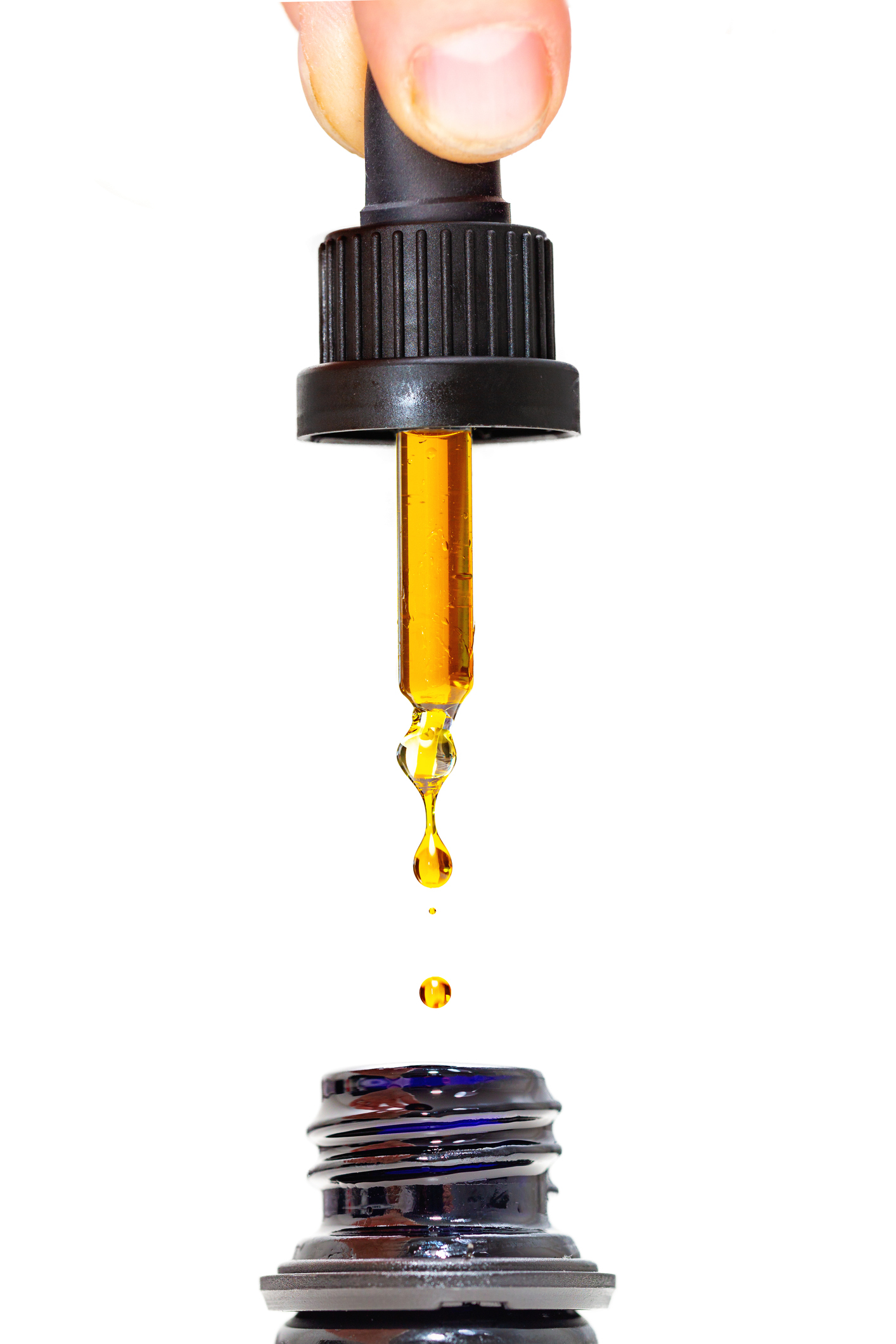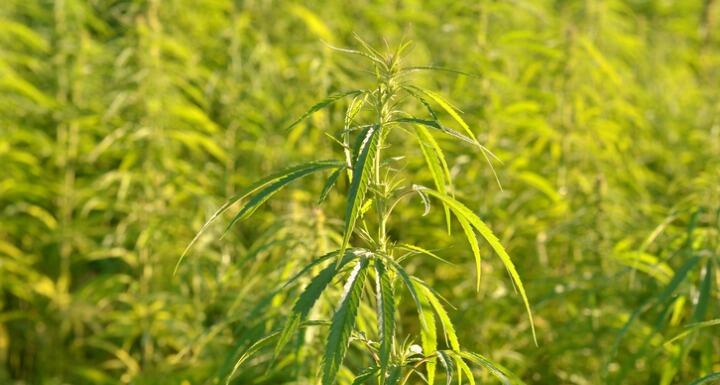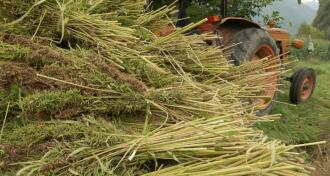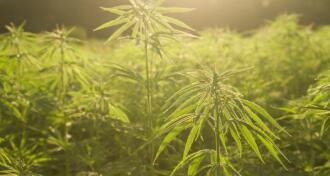Hemp has long held a prominent place in our nation's agricultural history.
Hemp was a staple crop in Colonial America. It was present on both Thomas Jefferson and George Washington's plantations. Ships of that era, including the U.S.S. Constitution, were laden with hemp rope and sails, and Betsy Ross's iconic American flag was made from hemp fiber. During World War II, the United States Department of Agriculture facilitated the cultivation of domestic hemp in response to the loss of imports due to Japanese conquests in the Pacific.
But the story of hemp, especially over the last half century, is not a simple or consistent one – largely because hemp is horticulturally and historically linked to marijuana. But, hemp and marijuana are not the same thing. Both come from the Cannabis sativa (L.) plant, but hemp is not psychoactive and it contains no more than 0.3% delta-9 tetrahydrocannabinol (also called THC), the chemical substance commonly associated with marijuana’s “high effect” by dry weight.
A New Era for Hemp
For nearly 50 years, our federal government classified hemp as "marijuana" and labeled it a Schedule I controlled substance under the Controlled Substances Act. That classification made domestic production and sales largely illegal, and led American companies and consumers to source and import their supply of hemp from foreign markets – most commonly, from Canada and China. Despite legislative prohibitions on domestic hemp production, American companies and consumers did not give up on the plant and its beneficial use in commerce.
Hemp, as an agricultural commodity, is used in the production of a wide range of products, including foods, beverages, cosmetics, personal care products, nutritional supplements, fabrics, textiles, fibers, paper, construction materials, and many other manufactured goods. It can be grown for its fiber, seed, and flower.
According to a June 2018 article by the Congressional Research Service, “Hemp as an Agricultural Commodity,” U.S. hemp product sales were estimated to be nearly $700 million in 2018. Despite significant legal challenges and risks in the industry, hemp is big business. And that big business is growing.
On Dec. 20, 2018, President Donald Trump signed into law the Agriculture Improvement Act of 2018 (2018 Farm Bill). That stroke of the pen ushered in a new era for domestic hemp production and sales in America. Among other things, the 2018 Farm Bill reversed course on 50 years of hemp prohibition by federally decriminalizing hemp and its derivatives, removing them from the Controlled Substances Act entirely, ensuring the lawful interstate transportation and sale of hemp and hemp products, authorizing banking services and crop insurance for the industry, and setting the legal foundation for a domestic production program that resembles other commodity crops, like tobacco and soybeans.
The 2018 Farm Bill also allows individual states to opt into primary regulatory authority over hemp production within their borders, if they choose to do so, and it preserves the right of the USDA, FDA, and other agencies to exercise regulatory jurisdiction over the industry and its products.
In a nutshell, the 2018 Farm Bill set the final stage for American hemp's agricultural and commercial renaissance.
Hemp Today and Hemp Tomorrow
Without a doubt, cannabidiol or CBD occupies the largest sector of the commercial hemp market today. CBD is a cannabinoid that exists in the cannabis plant. It is commonly sourced from the flowers of hemp varietals that have been selectively bred over time to produce high concentrations of CBD and very low (or, in some instances, no) concentrations of delta-9 THC.
 Anecdotal claims abound about CBD's helpful properties, with commonplace industry acceptance that the cannabinoid can be used to, among other things, alleviate inflammation and anxiety. As a result, CBD has been, and it continues to be, incorporated into a wide variety of consumer products, including foods, beverages, personal care products, cosmetics – and even an FDA-approved prescription medicine. Cowen & Co. recently projected that the CBD market alone could reach $16 billion by the year 2025. The growing popularity and acceptance of hemp as a whole has been fueled in large part by the exponential growth of CBD, which shows little signs of slowing down.
Anecdotal claims abound about CBD's helpful properties, with commonplace industry acceptance that the cannabinoid can be used to, among other things, alleviate inflammation and anxiety. As a result, CBD has been, and it continues to be, incorporated into a wide variety of consumer products, including foods, beverages, personal care products, cosmetics – and even an FDA-approved prescription medicine. Cowen & Co. recently projected that the CBD market alone could reach $16 billion by the year 2025. The growing popularity and acceptance of hemp as a whole has been fueled in large part by the exponential growth of CBD, which shows little signs of slowing down.
But regulatory uncertainty continues to loom over the hemp-derived CBD industry. The FDA has not provided clear guidance and regulations for the industry. The USDA only recently released its Interim Final Rule for U.S. domestic hemp production and many questions remain about the enforcement and interpretation of those regulations. The biggest unknown for CBD at the present stems from its uncertain treatment by the FDA – especially as it relates to use of CBD in food, beverage, and supplement products. Since the 2018 Farm Bill became law, the FDA has taken an active role in the regulation and enforcement of hemp and CBD products. It has consistently maintained the public position that:
- Hemp and hemp-derived CBD products that are marketed with a claim of therapeutic benefit, or with any other disease claim, must be approved by the FDA before being introduced into interstate commerce.
- It is unlawful to introduce food or beverages containing added CBD or THC into interstate commerce.
- It is unlawful to market products containing any hemp-derived CBD or THC as, or in, dietary supplements.
The FDA has assured the public that it is committed to finding a regulatory "pathway forward" for the sale of retail CBD food, beverage, and supplement products, but it may be some time before any official steps are taken to implement guidelines and policies.
CBD is a critical pillar of the hemp industry today and it will continue to be for the foreseeable future.
But, the story does not stop there. The hemp plant has an abundance of untapped agricultural potential. Nearly every part of the hemp plant has a viable commercial use.
In addition to CBD, more than 100 individual cannabinoids have been isolated and identified in the hemp plant – holding the possibility of additional health, wellness, and medicinal benefits. More dedicated research is needed to investigate and unlock that potential, but opportunities exist for commercial development and exploitation.
Hemp seed and its derivative oils are lawfully used today in foods, beverages, soaps, shampoos, and other products. And hemp is an environmentally friendly, sustainable, and regenerative source of fiber and hurd, which can be used as an effective base component for a multitude of commercial goods, ranging from fabrics, textiles, yarns, spun fibers, paper, building materials, bioplastics, and animal bedding.
In order to fully develop and realize the massive economic benefits presented by the fiber and seed sectors, the young hemp industry needs simultaneous, collective buy-in from farmers, processors, manufacturers, and consumers. Without each link in the chain of commerce, hemp fiber and grain may never reach their full potential.
North Carolina's Incredible Opportunity
We are a state built on agriculture. Agribusiness, including food, forestry and fiber, contributes approximately $87 billion to our state's economy, according to the North Carolina Biotechnology Center's 2019 North Carolina Ag Tech Economic Growth Report. But much of our agricultural economy is built on just a handful of crops, most notably tobacco, soybeans, corn, hay, cotton, and sweet potatoes. Hemp represents an opportunity to diversify that crop portfolio in a meaningful way.
Our farmers are enthusiastic about the opportunity, and they desperately need it to succeed. In 2017, only about 100 farmers sought and obtained licenses to grow hemp from the North Carolina Industrial Hemp Commission (NCIHC) – our state's licensing body for hemp cultivation. Today, the NCIHC reports that number is in excess of 1,350. Our state has licensed the production of hemp on more than 16,900 outdoor acres and in more than 6,560,000 square feet of greenhouses across North Carolina.
All of this is occurring despite the industry's lack of access to traditional crop insurance, institutional lending, banking services, merchant services, and in a climate of extreme regulatory uncertainty.
North Carolina is incredibly well-positioned to be at the forefront of the new American hemp economy. Our geographic position is ideal to grow hemp, we have more available farmland and a better agricultural infrastructure than many of our neighboring states, and we have developed a welcoming business climate that encourages and facilitates both internal and outside investment. Our state's human capital, the product of our robust historical agricultural economy, is a critical competitive advantage. We are also extremely rich in education, research, product development, and technology.
Although all of our universities contribute to the agricultural economy in many ways, North Carolina State University and North Carolina A&T State University are regional leaders in the agricultural world, and both have been instrumental in the development of North Carolina's hemp programs. Our leadership in the life sciences, biotechnology, and AgTech industries sets us further apart from the competition for economic investment, job creation, and opportunities. And last, but not least, we sit on a semi-dormant foundation of manufacturing and textile history and infrastructure, and it is easy to envision that springing back to life in our state's struggling rural communities on the back of hemp fiber.
North Carolina's embrace of hemp has also resulted in significant local and foreign investment and economic activity. More than 900 hemp processors are now registered with the NCIHC. Some are of significant industrial scale, and new projects and facilities are continuing to come online. But processing is not the only industry following hemp. Advanced testing facilities, marketing firms, brokering agents, distribution networks, and retail operations all are locating and conducting significant business here. We must continue to foster and develop the hemp industry as a whole within our state, but we are well-positioned to continue to benefit from these and other investments as the industry matures and the fiber sector takes hold.
Job and wealth creation will be welcome collateral effects of these developments and efforts, especially within our state's rural communities. It is no secret that rural North Carolina has suffered in recent years as populations have shifted to urban areas and certain industries, like textiles, have faltered. Hemp offers a much needed means to a better economic end for those areas. Those regions tend to be the agricultural drivers of our state, where hemp and other crops are planted, cultivated, and harvested. And, as a result, both small and large scale processing and manufacturing facilities are being located close to those farms, in communities like Wilson, Roxboro, Oakboro, Black Mountain, and Tabor City, among others.
The Opportunity is Fragile, and May be Fleeting
While North Carolina's opportunity in hemp is tremendous, industry participants and economic developers are keenly aware that we are not alone in this space. Other states around the nation are developing their own hemp programs and competitive advantages to capitalize on the industry. This period in the hemp industry's infancy represents a one-time opportunity for states to position themselves as industry leaders.
Some states are taking aggressively open approaches to their programs to attract more interest and investment. And we, in North Carolina, must not be short-sighted in our own legal, regulatory, and economic development efforts. Reasonable and common sense governmental regulation and product safety measures are necessary and openly welcomed in the state.
That said, our state must continue to provide an open market for the production and sale of all lawful commercial goods and avoid placing artificial and unnecessary restraints on our hemp farmers, processors, and retailers. We must continue to protect our farmers who undertake significant risks to cultivate hemp, and incentivize their diversification into additional varietals that support fiber and seed production – not just CBD. And we must empower and protect our processors, manufacturers, and retailers who drive the commercial demand for, and profitability of, our farmers' hemp crop.
Restrictions and hesitancy by our lawmakers and regulatory agencies will only empower our competitor states to pass us in the field. But, with a progressive approach to developing this industry for the benefit of our state, we can secure a new financial future for our citizens and businesses.
This article was first published in the Triangle Business Journal.









